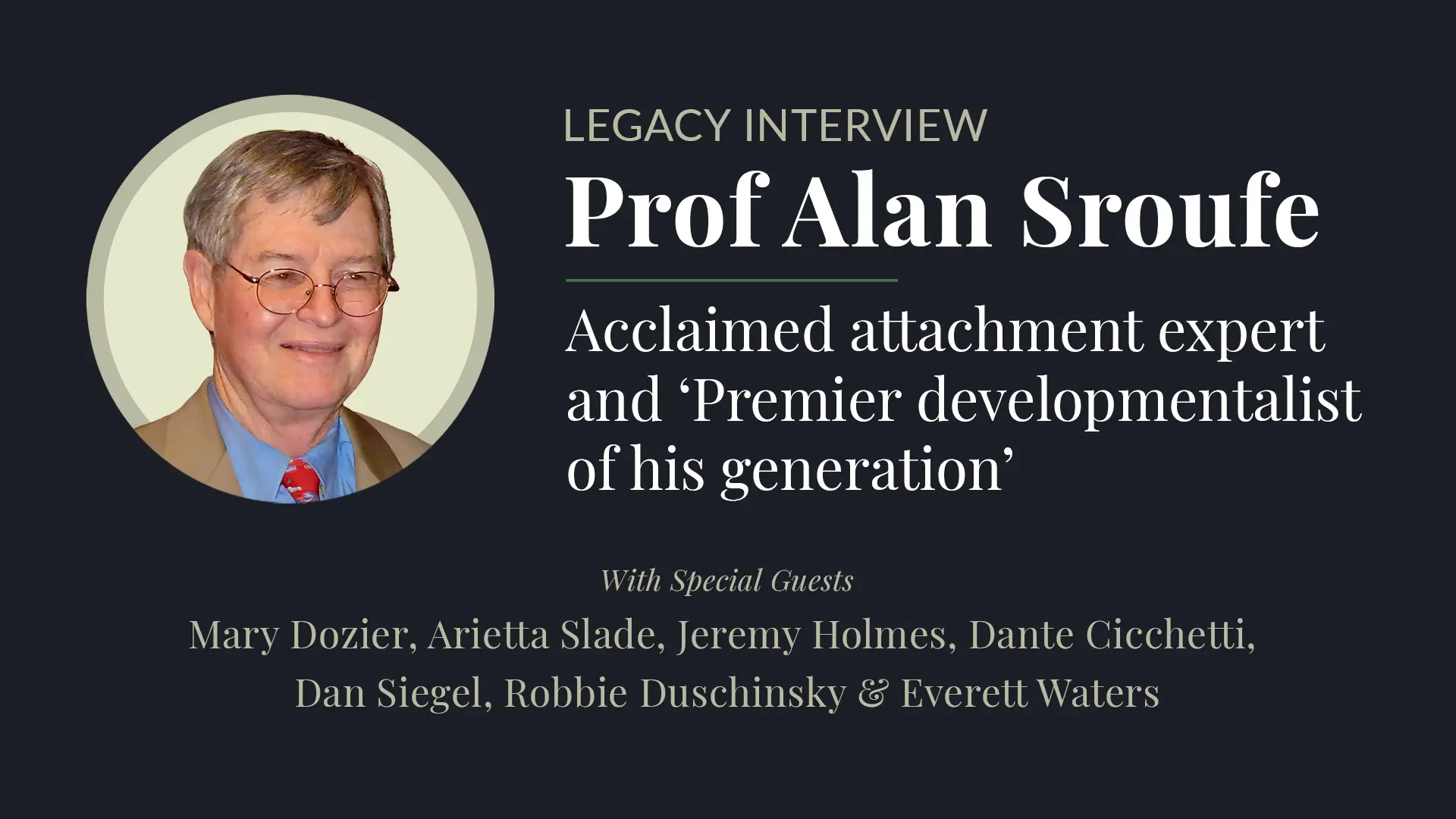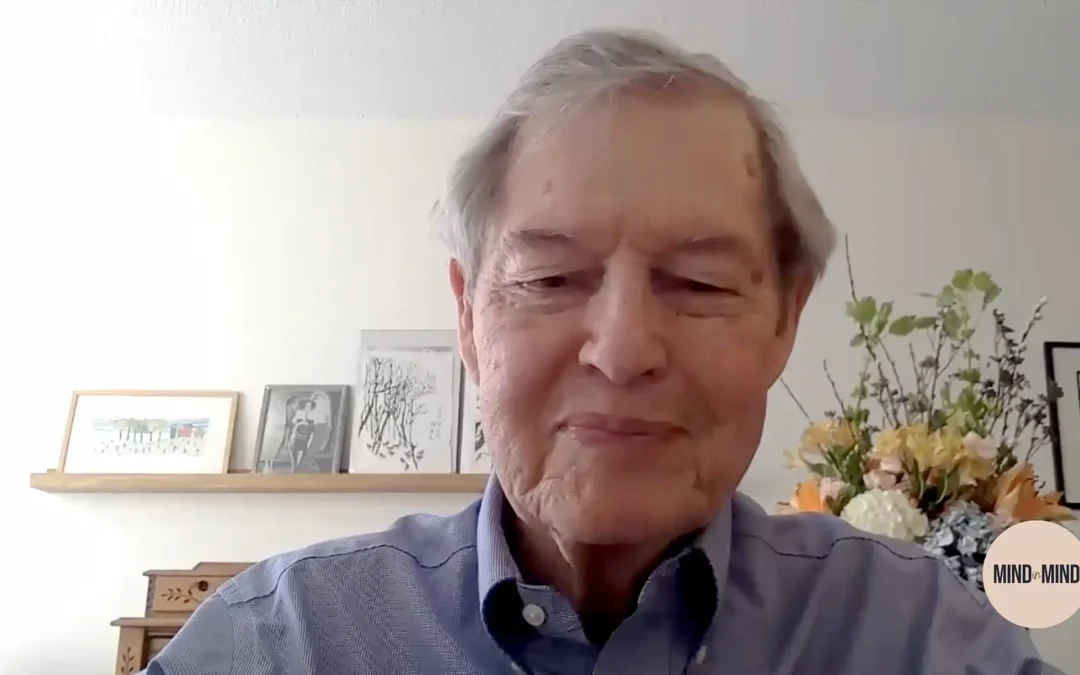
– Watch this recording for £39 includes a 2 hour CEU/CPD certificate –
Prof Alan Sroufe Legacy Interview
Legacy Interview with acclaimed attachment expert and ‘Premier developmentalist of his generation’
With Special Guests
Mary Dozier, Arietta Slade, Everett Waters, Dan Siegel, Jeremy Holmes, Dante Cicchetti & Robbie Duschinsky
“I wanted to let you know that of all the CE courses I have taken over the last three years the Alan Sroufe interview was the best—far above all the others. Thank you for creating this series.”
This Legacy Interview celebrates the remarkable contributions of Professor Alan Sroufe, a pioneering figure in the field of attachment research and developmental psychology. As Professor Emeritus at the University of Minnesota Institute of Child Development, Alan’s groundbreaking Minnesota Longitudinal Study of Risk and Adaptation provided compelling evidence for the critical role of early attachment relationships in shaping human development across the lifespan.
Joined by an renowned group of collaborators and researchers influenced by his work, this interview offers a captivating exploration of Alan’s significant impact on our understanding of attachment, relationships, and developmental trajectories. From his groundbreaking empirical research to his transformative insights for clinical interventions, Alan’s legacy is a testament to the power of attachment theory in illuminating the human experience.
Guest Speakers
Arietta Slade, Ph.D.
 Clinical psychologist, researcher, and professor of clinical child psychology at the Yale Child Study Center, recognised for her contributions to attachment theory, psychoanalysis, and infant mental health.
Clinical psychologist, researcher, and professor of clinical child psychology at the Yale Child Study Center, recognised for her contributions to attachment theory, psychoanalysis, and infant mental health.
Arietta shares how Alan’s work has shaped her understanding of attachment and its role in explaining children’s anxiety as a fear of losing contact with their parents. She discusses her work developing interventions to enhance parental reflective functioning, helping parents become more sensitive and aware of their children’s feelings and mental states.
Mary Dozier, Ph.D.
 Chair of Child Development and Professor in the Department of Psychological and Brain Sciences at the University of Delaware, celebrated for her work on the Attachment and Biobehavioral Catch-up (ABC) parenting program.
Chair of Child Development and Professor in the Department of Psychological and Brain Sciences at the University of Delaware, celebrated for her work on the Attachment and Biobehavioral Catch-up (ABC) parenting program.
Mary discusses how Alan’s work has influenced her Attachment and Biobehavioral Catch-up (ABC) parenting programme, which aims to change parenting behaviours to promote secure attachment. She emphasises the importance of targeting specific behaviours based on attachment theory, such as nurturing the distressed child, being attuned to the child’s signals, and avoiding frightening or intrusive behaviours.
Everett Waters, Ph.D.
 Professor Emeritus of Psychology at Stony Brook University and co-author with Mary Ainsworth of the influential volume “Patterns of Attachment,” who worked closely with Alan as a graduate student.
Professor Emeritus of Psychology at Stony Brook University and co-author with Mary Ainsworth of the influential volume “Patterns of Attachment,” who worked closely with Alan as a graduate student.
Everett reflects on his early collaboration with Alan as a graduate student, working on the Strange Situation procedure and the challenges they faced in establishing the validity and reliability of the measure. He emphasises the excitement and sense of discovery that characterised their work, as well as the close-knit and collaborative nature of their research group.
Daniel J. Siegel, M.D.
 Clinical professor of psychiatry at the UCLA School of Medicine and founding co-director of the UCLA Mindful Awareness Research Center, known for his work in interpersonal neurobiology.
Clinical professor of psychiatry at the UCLA School of Medicine and founding co-director of the UCLA Mindful Awareness Research Center, known for his work in interpersonal neurobiology.
Dan discusses how Alan’s work has provided an empirical foundation for understanding the biology of attachment and its impact on brain development. He explains how his own work in interpersonal neurobiology has built upon attachment research to explore the role of relationships in shaping neural integration and regulatory processes.
Jeremy Holmes, M.D.
 Distinguished NHS clinician and author with Arietta Slade of ‘Attachment in Therapeutic Practice’. He is recognised for his work on attachment theory and its application to psychotherapeutic practice.
Distinguished NHS clinician and author with Arietta Slade of ‘Attachment in Therapeutic Practice’. He is recognised for his work on attachment theory and its application to psychotherapeutic practice.
Jeremy reflects on how Alan’s work has allowed attachment theory to be applied in psychoanalytic thinking and clinical settings. He emphasises the importance of the quality of discourse and the creation of a sense of vitality and engagement in the therapeutic process, drawing parallels to the secure attachment relationship.
Dante Cicchetti, Ph.D.
 Professor Emeritus at the Institute of Child Development, University of Minnesota, and a pioneering figure in the field of developmental psychopathology.
Professor Emeritus at the Institute of Child Development, University of Minnesota, and a pioneering figure in the field of developmental psychopathology.
Dante shares his experiences as a graduate student working with Alan and the significant impact Alan had on his personal and professional development. He discusses their work together on the consequences of child maltreatment and the importance of considering the role of early experiences in shaping developmental trajectories.
Robbie Duschinsky, Ph.D.
 Professor of Social Science and Health at the University of Cambridge, known for his historical analysis of attachment research.
Professor of Social Science and Health at the University of Cambridge, known for his historical analysis of attachment research.
Robbie highlights under appreciated aspects of Alan’s methodology, particularly the use of composite measures to capture the emergent properties of attachment relationships. He emphasises Alan’s contributions to understanding the interplay between individual and family-level processes in shaping development and the regulation of emotion.
Key Insights:
- The critical role of early attachment experiences in shaping the development of the “self” and providing a foundation for future relationships and functioning.
- The importance of understanding attachment as an emergent property of child-caregiver relationships rather than a trait of an individual child.
- The power of secure attachment in promoting later independence, empathy, and resilience in the face of adversity.
- The significance of the Strange Situation procedure in efficiently capturing the emotional quality of attachment relationships.
- The definitive evidence provided by Alan’s work demonstrating the primacy of attachment, not temperament, in socioemotional development.
For Alan, this groundbreaking research has instilled a sense of optimism, highlighting the potential for a relational perspective grounded in attachment theory to address the challenges facing our world. The gratitude expressed by participants in his longitudinal study serves as a poignant reminder of the transformative power of treating others with dignity and contributing to the betterment of children’s lives.
As we explore into the depths of Alan’s research and its far-reaching implications, this Legacy Interview serves as a compelling testament to the enduring significance of his work in shaping our understanding of human development and fostering well-being across the lifespan.
Interviewer
Alan is in conversation with Jane O’Rourke.
Jane O'Rourke – Founder of MINDinMIND and former award-winning BBC journalist turned Child and Adolescent Psychotherapist. Jane brings a unique skill set to create rich and thoughtful conversations, weaving together the personal and professional threads of her guests' journeys.
This recording was made 28th March 2024
Bibliography & Resources
Two Matters for Clarification
Alan Sroufe asked us to clarify a couple of points he made in the interview related to attachment theory and research.
Here is a summary of the clarification:
- Temperament and Attachment: Alan acknowledges that temperament is a useful concept for describing individual differences in children but argues that it is not sufficient to explain the complex organisation of attitudes, expectations, beliefs, and behaviours that make up a person’s sense of self. Attachment theorists do not disregard temperament; in fact, parental sensitivity, a key aspect of attachment theory, involves responding appropriately to an infant’s temperament. However, Alan argues that temperament does not account for the variations in attachment classifications assessed using the Strange Situation procedure. Alan refutes Kagan’s assumption that the amount of distress an infant experiences during the assessment is crucial for classification, stating that it is the infant’s ability to be comforted by the caregiver, rather than the amount of crying, that determines the attachment classification.
- The Use of Other Measures Along with Attachment: Alan emphasises that constructs such as “relationships” and “self” cannot be directly measured and require a complex, longitudinal methodology to evaluate. Ainsworth’s attachment assessments at 12 months and sensitivity assessments at 3 and 6 months are ways of tapping into the ongoing process of self-development. Alan suggests that the best measure of the process of the self emerging from the relationship is the combination of measures in the first two years, although attachment measures alone do a remarkable job. Alan also notes that the self continues to develop beyond the first two years, with a gradual “disjoin” from the caregiving matrix, but support remains necessary throughout development.
Read the full text : Two Matters for Clarification – Alan Sroufe
The Verdict Is In
This article presents a strong case for the importance of attachment theory in understanding human development. Alan Sroufe and Daniel Siegel argue that the emotional quality of early attachment experiences is perhaps the single most important influence on development, challenging the views of those who emphasise the role of situational factors, genes, or temperament.
Key points from the article include:
- Attachment theory, developed by John Bowlby and Mary Ainsworth, posits that the quality of early caregiver-child relationships shapes later personality development.
- Ainsworth developed the Strange Situation procedure to measure the quality of attachment relationships, demonstrating that differences in attachment security are not simply reflections of infant temperament.
- The Minnesota Longitudinal Study of Risk and Adaptation (MLSRA) has shown that attachment security measured in infancy predicts various aspects of functioning throughout childhood and into adulthood, including emotional regulation, self-esteem, social competence, and the capacity for close relationships.
- Attachment history influences how children are treated by peers and teachers, often creating self-fulfilling prophecies.
- Children with secure attachment histories are more resilient and less vulnerable to stress, while those with anxious or disorganised attachment are at increased risk for psychopathology.
- Development is best viewed in terms of pathways, where change is always possible but constrained by previous experiences. Therapeutic experiences can alter an individual’s life course.
- Recent research on gene-environment interactions and neuroplasticity supports the idea that relationships can profoundly influence development throughout the lifespan.
Alan Sroufe and Daniel Siegel conclude by highlighting the clinical relevance of attachment theory, suggesting that therapists can use the power of attachment relationships to cultivate deep and lasting change in their clients.
Read the full article : The Verdict Is In.pdf
Major Findings
This text discusses major findings from research on child development, emphasising the importance of relationships, the coherence and transactional nature of development, and the central role of meaning.
Key points from the text include:
- The quality of caregiver-infant relationships, particularly attachment, predicts later functioning and adaptation.
- Development is coherent, with early experiences shaping later outcomes in complex ways.
- Change in adaptation can occur at any age and is influenced by changing circumstances and the quality of care.
- Early experiences, both positive and negative, are retained and influence later development, even after periods of change or improvement.
- Resilience is a developmentally acquired capacity, not an inherent characteristic.
- The child’s internal world, or representations, develops through a transactional relationship with their experiences.
Read the full text : Major Findings
Ainsworth Strange Situation 1969
This article “Attachment, Exploration, and Separation: Illustrated by the Behaviour of One-Year-Olds in a Strange Situation” by Mary D. Salter Ainsworth and Silvia M. Bell presents a study of infant-mother attachment using the “Strange Situation” procedure. The authors discuss their findings in the context of an ethological-evolutionary view of attachment theory.
Key points from the article include:
- Attachment behaviour and exploratory behaviour are viewed as being in balance, with the presence of the mother encouraging exploration and her absence heightening attachment behaviours.
- In the strange situation study, 56 one-year-old infants were observed in a series of episodes involving the mother, a stranger, and brief separations. The infants’ exploratory behavior, crying, search behaviour, proximity-seeking, contact-maintaining, contact-resisting, and proximity-avoiding behaviours were measured.
- The presence of the mother was found to support exploratory behaviour, while her absence led to increased crying, search behaviour, and proximity-seeking upon reunion.
- Some infants displayed contact-resisting and proximity-avoiding behaviours, suggesting ambivalence or defensive responses.
- The authors discuss their findings in relation to other observational, clinical, and experimental studies of human and nonhuman primates, highlighting the continuity between the behaviours observed in the Strange Situation and those reported in other contexts, such as longer-term mother-child separations.
- The authors propose several key features of a comprehensive concept of attachment, emphasising that attachment is distinct from attachment behaviour, that the latter is heightened in threatening situations and diminished in the presence of the attachment figure, and that individual differences in attachment relationships are qualitative rather than quantitative.
This article underscores the importance of considering attachment behaviour within an ethological-evolutionary framework and of using a wide range of studies to inform the understanding of attachment relationships.
Read the full article : Ainsworth Strange Situation 1969.pdf


